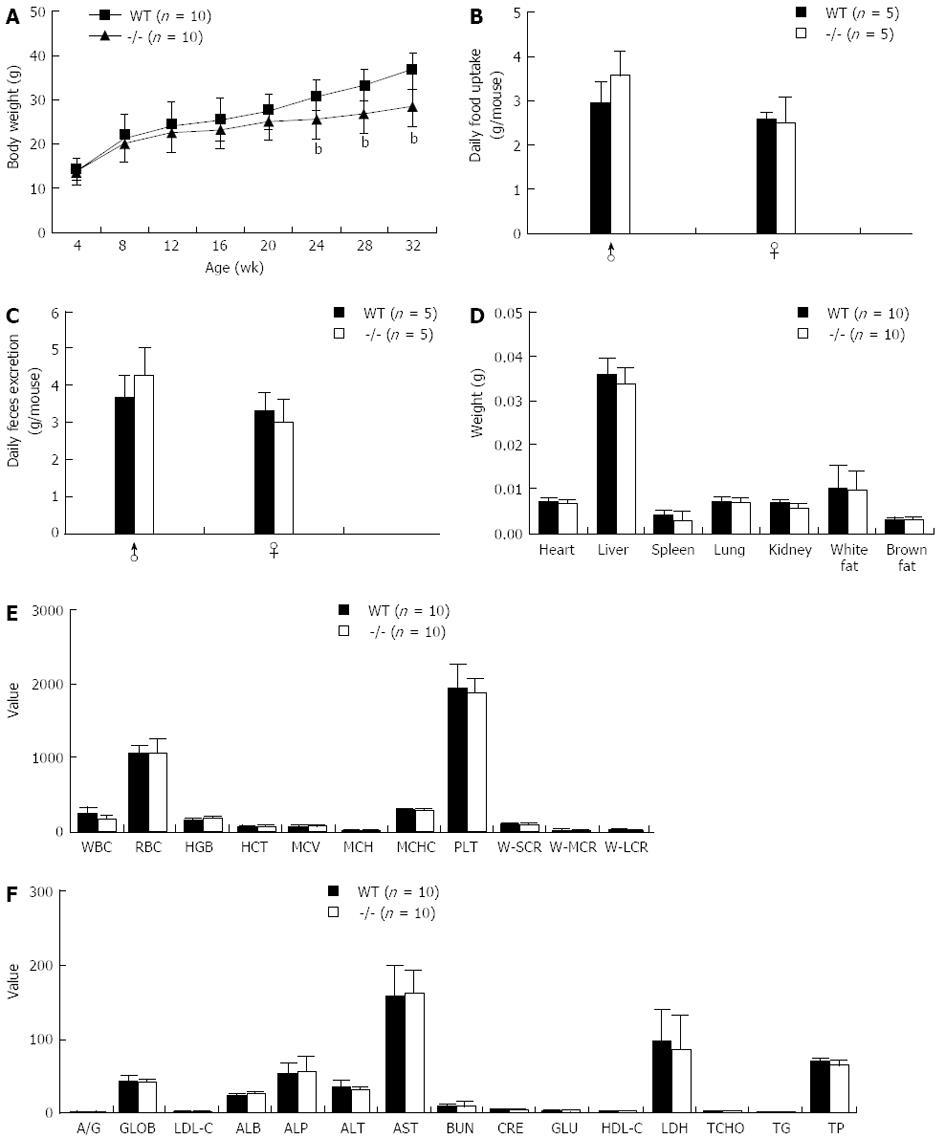Copyright
©2014 Baishideng Publishing Group Co.
World J Gastroenterol. Jan 14, 2014; 20(2): 498-508
Published online Jan 14, 2014. doi: 10.3748/wjg.v20.i2.498
Published online Jan 14, 2014. doi: 10.3748/wjg.v20.i2.498
Figure 3 Deletion of Gpr128 results in reduced body weight gain in mice.
A: An analysis of the body weight of mice of different genotypes shows that Gpr128-/- mice have a reduced body weight (P values of weeks 24, 28 and 32 are 0.0065, 0.0010 and 0.0003); B: Daily food intake of 16-wk-old mice of different genotypes (P > 0.05); C: Daily fecal excretion of 16-wk-old mice of different genotypes (P > 0.05); D: Organs isolated from 32-wk-old animals weighed and correlated to body weight (P > 0.05); E: Blood routine test of 32-wk-old animals using an automated hematology analyzer (P > 0.05; WBC: White blood cells; RBC: Red blood cells; HGB: Hemoglobin; HCT: Hematocrit; MCV: Mean corpuscular volume; MCH: Mean corpuscular hemoglobin; MCHC: Mean corpuscular hemoglobin concentration; PLT: Platelet; W-SCR: White-small cell rate; W-MCR: White-middle cell rate; W-LCR: White-large cell rate); F: Biochemical parameters of 32-wk-old animals using an automated chemistry analyzer (P > 0.05; A/G: Albumin/globulin; GLOB: Globulin; LDL-C: Low-density lipoprotein cholesterol; ALB: albumin; ALP: alkaline phosphatase; ALT: Alanine aminotransferase; AST: Aspartate aminotransferase; BUN: Urea nitrogen; CRE: Creatinine; GLU: Glucose; HDL-C: High-density lipoprotein cholesterol; LDH: Lactate dehydrogenase; TCHO: Total cholesterol; TG: Triglyceride; TP: Total protein). All values are mean ± SD (n = 10, bP < 0.01 vs wild-type group).
-
Citation: Ni YY, Chen Y, Lu SY, Sun BY, Wang F, Wu XL, Dang SY, Zhang GH, Zhang HX, Kuang Y, Fei J, Gu MM, Rong WF, Wang ZG. Deletion of
Gpr128 results in weight loss and increased intestinal contraction frequency. World J Gastroenterol 2014; 20(2): 498-508 - URL: https://www.wjgnet.com/1007-9327/full/v20/i2/498.htm
- DOI: https://dx.doi.org/10.3748/wjg.v20.i2.498









